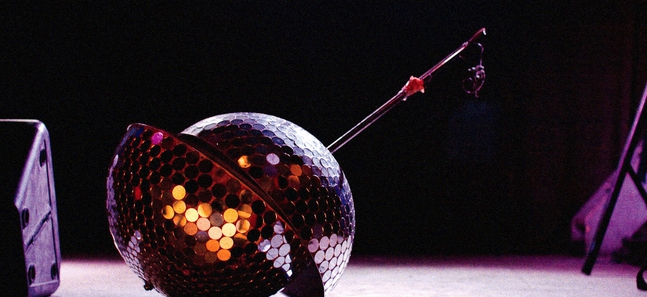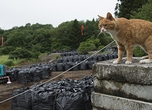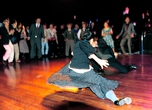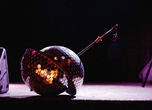Japan: no dancing please
Police are raiding clubs nationwide for the ‘crime’ of dancing. What’s going on?

An out-of-acton mirrorball at Noon in Osaka. The club was raided by police in April for permitting dancing without a license
Posted: Fri Oct 12 2012
If you want to get an inkling of quite how strange life has become for nightclubs in Japan, chew on this. At around 3.40am on September 2, a group of masked men armed with steel pipes burst into the VIP room at Flower, a club in central Roppongi, and beat 31-year-old restaurant owner Ryosuke Fujimoto to death. There were around 200 other people there at the time, but so far no arrests have been made in connection with the murder.
Yet when Flower's owner reopened a few weeks later under a new name, Studio Gate, the police were swift to act. On October 1, Mikito Baba and seven of his employees were arrested for a crime that, in comparison to going Ichiro Suzuki on someone's skull, may seem rather quaint. But it's one that will be all too familiar to any club owner in Japan: they were letting people dance.
When you consider Tokyo's standing as one of the clubbing capitals of the world, it can come as a surprise to discover that its fabled nightspots are operating illegally. Dancing isn't exactly forbidden here, but it's only allowed in certain places, and regulated in such a way that all-night parties can't technically happen. No ifs, no buts: can't.
Under the Law on Control and Improvement of Amusement Business (known as fueiho in Japanese, a contraction of fueiho eigyo-to no kisei oyobi gyomu no tekiseika-to ni kansuru horitsu), any establishment that permits dancing must obtain a license. This in turn imposes a number of requirements, the most significant of which are size – the main room must have at least 66m2 of unobstructed floor space – and opening hours: depending where it's located, a club must close by either midnight or 1am.
Think about that for a second, then try to square it with any of the parties you've been to recently. As club scene veteran DJ Emma put it in an interview with EyesCream magazine earlier this year, 'Every weekend, we DJs are breaking the law.' And for years – decades, in fact – they've been getting away with it.
That's all starting to change, though. Ask anyone from Osaka, and they can tell you what's happened to the club scene there: it's dead. Since 2010, the police have been taking the fueiho law at face value, busting all-night parties and shutting down clubs that are permitting dancing without a proper license. What's more, the trend seems to be spreading.
Big-name techno DJ Takkyu Ishino had only just started his set at O/D in Fukuoka on the morning of April 15 this year when the club was raided by police and the party summarily shut down. 'Dance is not a crime,' he wrote on Twitter shortly afterwards, a statement that's since been retweeted nearly 3,900 times.
When I interviewed him a few months later, it was one of the first things he wanted to talk about. 'These problems with the police are happening all over the place,' he said. 'Short of changing the law, I don't know what we can really do about it, though… If we have demonstrations, it's not going to change anything. It might just draw the police's attention and make things even worse.'
This sense of helplessness, a keep-your-head-down-and-everything-will-be-okay mentality, pervades the club scene here. Venues routinely post 'No dancing' signs, with some even sending staff onto the floor to ask customers to stop moving to the music (I wish I was making this up). Nightclubs advertise themselves with vague descriptions like 'entertainment space', and expressly forbid any use of the word 'dance' in advertising copy. In the case of one world-famous party spot in Shibuya, you won't even find the term 'DJ' used anywhere on their website. Life's tough when you're living in a grey zone.
To understand the present-day predicament of Japan's nightlife scene, it helps to look at the context in which it developed. The fueiho law regulating clubs actually includes a far wider swathe of establishments, from restaurants to mahjong parlours. It also, albeit in a separate section, regulates the sex industry: love hotels, adult goods shops, strip clubs and 'soapland' brothels are all included. And although it seems bizarre now to equivocate dancing with prostitution, when the law was first enacted in 1948, the two weren't all that far removed.
The first police crackdown on Japanese dancers had actually occurred in 1925, as dance halls proliferated around the capital. When a friend of the Superintendent General's complained that her son had eloped with a girl he met at one such establishment, strict ID checks were imposed at every hall and plain-clothes police officers began to patrol the dancefloors. Unsurprisingly, this was all a little off-putting for the young women who had previously frequented such places, so a new system developed: venues started to employ so-called 'taxi dancers', who would receive tickets from male customers in return for a quick Charleston.
In post-war Japan, the sudden influx of American GIs pushed the country's dance halls even deeper into iniquity. Occupation troops in search of a quick screw discovered that they could find one quite easily under the cover of music, often negotiating the terms of the transaction while on the dancefloor. But with the law on prostitution at the time only regulating organised brothels, there was nothing to prevent such licentiousness – hence the emphasis of the new fueiho law on control and, ahem, 'improvement'.
If the nightclubs were still being policed with a 64-year-old law now, it might be easier to understand the recent clampdown on unlicensed dancing. In fact, the fueiho has been modified a number of times since it was first introduced. The most recent major changes came in 1984, partly in response to concerns about Japanese youngsters running riot in the nation's discos and late-night video arcades. In one notorious case, known as the Kabukicho Disco Murder, a pair of junior high school girls went for a drive with a man they'd met while partying in Shinjuku, only for him to murder one of them and leave the other for dead.
Cue plenty of hand-wringing. Over 200,000 signatures were collected for a petition demanding changes to the fueiho law, and the resulting revisions included the first nationwide stipulations on opening hours. (Funnily enough, Tokyo discotheques had previously been required to close at 11pm, but let's not get distracted by that.) With the prospect of all-night parties becoming verboten, and police taking a tough line against any violators, many of the new venues on Japan's emerging club scene chose to be classified as food and drink establishments instead. There was only one problem: it meant that people couldn't actually dance there.
Mind you, it's perfectly normal in Japan for laws to say a lot of things that they don't actually do, and for a long time this was true of the fueiho. After an initial burst of activity in the mid-'80s, the police's clean-up drives became more piecemeal, with the fueiho law often being used as a means to penalise clubs for other infractions such as excessive noise and drug problems. But that all changed in 2010, starting with what was once one of the country's most vibrant nightlife districts, America-mura in Osaka.
In January 2010, a 22-year-old student from Kyoto Sangyo University died from injuries sustained in a street brawl that had originated in one of the neighbourhood's clubs. It was the latest in a series of incidents in the area, including drug arrests and another death back in 2008, which had taken place against a background hum of mounting media hysteria over recreational drugs. (Blame former pop idol Noriko 'Nori P' Sakai, whose public downfall after testing positive for amphetamines in the summer of 2009 led to all kinds of fear-mongering about the nation's out-of-control club culture.) With complaints also coming in from local residents and business owners about the noise and general unruliness at night, the Osaka police instituted a systematic crackdown, targeting any clubs that were flouting the fueiho law. Unsurprisingly, this was all of them.
Triangle, Grand Cafe, Onzieme, Joule, Sound-Channel, Lunar Club: over the course of the following 18 months, venues throughout America-mura were hit by police. Some never reopened; those that did – such as Triangle and Onzieme – now have to close their doors at 1am, with a predictable effect on both attendance and bar sales.
Had it only gone that far, it might have been possible to characterise the police campaign as a heavy-handed response to legitimate, local problems. But the Footloose free-for-all was spreading: Osaka clubs well outside the radius of America-mura were caught in the anti-dancing dragnet, while reports began to come in of similar crackdowns in Fukuoka and Kyoto.
The police tactics could be impressively anal, too. Noon, a club that had been operating without incident in Osaka's Umeda district for 18 years, was raided at 9:43pm on a Wednesday night in April, meaning that the 45 police officers outnumbered the customers more than two to one. World, the largest club in Kyoto and a veritable piñata for the local authorities, was finally dinged at the end of last year – not for dancing this time, but for installing an extra bar in the premises without getting permission first. And that police invasion which prematurely ended Takkyu Ishino's party at O/D? 'It turned out that they were really doing it as a training exercise for new recruits,' he told me later.
Don't think that Tokyo has been spared, either. Cavernous Roppongi club Alife closed its doors earlier this year after owner Katsuhiro Kasai was arrested for fueiho violations. Following repeated problems with the police, nearby salsa club Sudada closed and reopened as a sit-down Latin restaurant. Over in Shinjuku Ni-chome, meanwhile, the once riotous gay district has suddenly had to sober up, with venues posting 'no dancing' notices out of fear that they'll get an unwelcome visit from the cops.
So why is all of this really happening? It's a question to which I've heard a variety of answers over the past four months, ranging from plausible to paranoid. In the recently published Odotte wa ikenai kuni, Nihon (Japan, the country where you mustn't dance), a collection of essays and interviews edited by music writer Ryo Isobe, there's a recurring argument about the authorities' desire to get rid of perceived grey areas in Japanese society. Kureichi Matsuzawa, a freelance journalist who's earned the sobriquet 'fuzoku writer' for his coverage of the entertainment and sex industries, links the war on dancing to a wider campaign on public morality that started in Kabukicho in the early 2000s. After clampdowns on sex clubs, love hotels and S&M bars, he argues, clubs were simply next in line.
Others claim that the police aren't interested in dancing at all: they're simply using the fueiho laws as cover for other investigations. When I put the question to a club operator in Kansai with over two decades of experience, who spoke anonymously out of concern that his venue would land on the shitlist next, he didn't have any doubts about the real reason: 'It's convenient. It's very convenient. Say they're interested in gang links or drugs: when you're just going on a rumour, it's really difficult to uncover the truth through investigations. Really difficult. But if you're arresting people just over dancing, you can give them a thorough interrogation – even requisition their bank books – while they're in custody.'
This was borne out by the experience of Noon's owner, Masatoshi Kanemitsu. When his club was raided on April 4 this year, he was taken into custody along with seven of his staff, and held for 22 days before being formally charge and released on ¥2 million bail. In the course of the interrogations, he was forced to surrender his bank details and questioned about specific transactions – a telltale sign that his questioners weren't particularly interested in dancing either.
'The police thought that clubs were shady, that they had connections with organised crime,' he says during an interview at the club, which is now being used as a café and bar. 'But in the past two years of arrests, they haven't found a single club in Osaka that had gang ties.'
This point is reiterated by Stefan Saxanoff, an expat club owner who fell afoul of the fueiho laws long before the current wave of police busts: 'No one that I know of – anyone in this business – has ever had any kind of criminal convictions. I've never even had a goddam traffic conviction.'
Saxanoff and a pair of partners had run Club Pure, an all-you-can-drink meat market, in Yokohama for nearly seven years without any major problems. 'I was on really good terms with the police,' he says. 'Whenever there was any kind of issue whatsoever, they would come and talk to me. We always did clean-up after closing hours, we made sure that people didn't loiter outside – everything to make sure… We were probably one of the first clubs in the country to do a strict ID check.'
However, none of this seemed to make much difference when, in late 2005, the police walloped Pure for fueiho violations. After attempting – unsuccessfully – to fight his case in the courts, Saxanoff is understandably frustrated by the vagaries of the legal system. He points to the example of pachinko, where customers win tokens that they can later exchange for cash – 'money laundering for gambling', as he puts it – as one example of a widespread practice that's technically illegal, yet still permitted. 'The Japanese laws are so skewed and haphazard all over the place that there is no way to predict, as a business owner, how the law is going to be administered,' he says. 'So you're just kind of screwed, right?'
His explanation for the anti-dancing campaign is by far the most unusual, though it probably makes sense when you've spent the past half decade living like a character in a Kafka novel. He pins the blame on a piece of legislation called the Gyoseikikan ga okonau seisaku no hyoka ni kansuru horitsu, a policy evaluation law introduced in 2001 that requires government bodies to give regular updates on the various regulations that fall within their jurisdiction. In theory, it should make it easier to keep track of whether existing laws are working as they should be, but in the case of the fueiho law he says it's had the opposite effect: rather than get rid of an obsolete rule, the police have instead decided to prove its relevance by actively enforcing it.
'It's a really important law,' he says of the policy evaluation law; 'and it's solely meant to restrict the activities of government. And yet it doesn't work at all – in fact it's being used in the opposite direction.'
'So you're basically being fucked...' I begin, and he completes the sentence for me: 'by bureaucracy.'
Saxanoff's experiences might serve as a cautionary tale for Noon's Kanemitsu, who – uniquely among the club owners targeted in the current crackdown – is going to court over his case, with the help of a 20-strong legal team. It's a brave move, which he hopes will force the legal issue into the open. 'I'm not reopening as a club until they change the law,' he says, 'If they don't change it, I don't think I'll want to live in this country any more.'
His efforts have made him one of the most prominent figures in Let's Dance, a nationwide campaign to have regulations on dancing removed from the fueiho laws altogether. The movement started in Kyoto in February this year, when Kazuo Nakamura, a lawyer running in the mayoral elections, used his platform to draw attention to the laws. Since then, the organisation has been conducting an online PR blitz while collecting signatures at clubs and major music festivals for a petition that will be presented to lawmakers at the end of the year (at the time of writing, they're just shy of 80,000 names).
Kanemitsu was present at the first public meeting arranged by Let's Dance, held in June at the now-mothballed World in Kyoto, and again when they held a second meeting in Tokyo in September. But the difference in atmosphere between the two events was striking: while the Kyoto gathering was a tense powwow that attracted many club owners directly affected by the crackdown, in Tokyo there was far less sense of urgency to the proceedings. It was indicative of a wider problem: given the grey zone that they inhabit, club owners are reluctant to speak out about the laws – provided, at least, that they're still actually in business.
While Let's Dance has a solid infrastructure in Kansai, their activities in Tokyo over the summer were essentially a one-man show. Lawyer Takahiro Saito looks exhausted when I meet him for lunch in September, a few days after the Tokyo meeting. 'Tokyo clubs aren't really concerned about this problem,' he says. While he's been approaching club owners in the capital directly to ask them to participate, he says that some are reluctant to do so, for fear of attracting the authorities' attention.
With good reason, too. Just a few days after the Let's Dance meeting here, the police descended on a string of clubs in the Shibuya area, including Club Asia and Vuenos. The timing may have been coincidental, but one local club promoter described it to me later as 'scary'.
It's with this in mind that Saito has been in talks with Diet members, three of whom – from the ruling Democratic Party of Japan and the Japanese Communist Party – were present at the Tokyo meeting. He's also planning to arrange a visit by representatives of the Berlin Club Commission, a coalition of clubs and event organisers that acts as a lobbying group for the industry, with a view to setting up a similar organisation in Japan. Doing so wouldn't just help clubs speak with a unified voice – it might also improve their public standing.
But in moments of doubt, he admits that it might all be a lost cause. Not because the police will beat them to it. Not because clubs will be stymied by absurd regulations about opening hours and how customers can and can't move their own bodies in response to music. No: it's just that Japan's clubbers are getting older, and there don't seem to be many young ones replacing them. 'Even without the fueiho, I'm worried that maybe we're at the end of the club era,' he says as we finish our lunch.
Kanemitsu might have an answer to that concern, though. Talking at the Let's Dance meeting last month, the day before he was due to appear in court for his preliminary hearing, the Noon owner spoke about the need to take Japan's underground dance culture overground. That's what gave him the idea for his next project. 'I'm thinking about making a club that junior high and high school students can go to,' he said. 'It doesn't make financial sense just to target adults who turn up after 10pm, once when they've finished work. Look at karaoke: it's cheap in the daytime, so housewives go there, school kids go there. I think we need to expand in that direction too.'
Things are weird for Japanese clubs at the moment. But they might be about to get even weirder.
UPDATE: What do you think about the current situation regarding clubs in Tokyo? What's the environment like where you live, wherever in the world that may be? Take our survey and let us know!
Tweets
- About Us |
- Work for Time Out |
- Send us info |
- Advertising |
- Mobile edition |
- Terms & Conditions |
- Privacy policy |
- Contact Us
Copyright © 2014 Time Out Tokyo














Add your comment